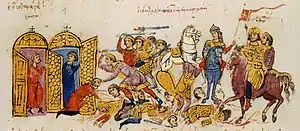821
Year 821 (DCCCXXI) was a common year starting on Tuesday (link will display the full calendar) of the Julian calendar.
| Millennium: | 1st millennium |
|---|---|
| Centuries: | |
| Decades: | |
| Years: |
| 821 by topic |
|---|
| Leaders |
|
| Categories |
|
| Gregorian calendar | 821 DCCCXXI |
| Ab urbe condita | 1574 |
| Armenian calendar | 270 ԹՎ ՄՀ |
| Assyrian calendar | 5571 |
| Balinese saka calendar | 742–743 |
| Bengali calendar | 228 |
| Berber calendar | 1771 |
| Buddhist calendar | 1365 |
| Burmese calendar | 183 |
| Byzantine calendar | 6329–6330 |
| Chinese calendar | 庚子年 (Metal Rat) 3517 or 3457 — to — 辛丑年 (Metal Ox) 3518 or 3458 |
| Coptic calendar | 537–538 |
| Discordian calendar | 1987 |
| Ethiopian calendar | 813–814 |
| Hebrew calendar | 4581–4582 |
| Hindu calendars | |
| - Vikram Samvat | 877–878 |
| - Shaka Samvat | 742–743 |
| - Kali Yuga | 3921–3922 |
| Holocene calendar | 10821 |
| Iranian calendar | 199–200 |
| Islamic calendar | 205–206 |
| Japanese calendar | Kōnin 12 (弘仁12年) |
| Javanese calendar | 717–718 |
| Julian calendar | 821 DCCCXXI |
| Korean calendar | 3154 |
| Minguo calendar | 1091 before ROC 民前1091年 |
| Nanakshahi calendar | −647 |
| Seleucid era | 1132/1133 AG |
| Thai solar calendar | 1363–1364 |
| Tibetan calendar | 阳金鼠年 (male Iron-Rat) 947 or 566 or −206 — to — 阴金牛年 (female Iron-Ox) 948 or 567 or −205 |

Thomas the Slav captures cities in Anatolia
Events
Byzantine Empire
- Byzantine general Thomas the Slav leads a revolt and secures control over most of the Byzantine themes (provinces) in Anatolia. He gets recognition from the Abbasid Caliphate, and concludes a peace treaty with Caliph al-Ma'mun. Thomas crosses with his fleet from Abydos to Thrace, and blockades Emperor Michael II in Constantinople; but Thomas' first attack on the capital fails.
Europe
- February – Duke Borna of Croatia dies after an 11-year reign, as vassal of the Frankish Empire. He is succeeded by his nephew, Vladislav.[1] Emperor Louis I recognizes him as prince of Dalmatia and Liburnia, at the Council of Aachen.
- October – Lothair I, co-emperor and eldest son of Louis I, marries Ermengarde in Thionville (northeastern France). She is the daughter of Count Hugh of Tours.
Britain
- King Coenwulf of Mercia dies in Basingwerk near Holywell (Wales), while preparing for another assault on Powys, and is buried in Winchcombe Abbey. He is briefly succeeded by his son Cynehelm, but he is killed, probably fighting the Welsh, though supposedly through the treachery of his sister Cwenthryth. The Mercian throne passes to Coenwulf's brother, Ceolwulf I.
Abbasid Caliphate
- By the time Al-Ma'mun became caliph, the Arabs and the Byzantines had settled down into border skirmishing, with Arab raids deep into Anatolia to capture booty.
- Tahir ibn Husayn, an Iranian general, is appointed as governor of Khurasan, as a reward for supporting the Abbasid caliph al-Ma'mun in the Fourth Fitna.
- Caliph Al-Ma'mun appointed Nu'aym ibn al-Waddah al-Azdi as the governor of Yemen in 821.
Births
- Gao Pian, general of the Tang dynasty (d. 887)
- Gisela, Frankish princess, daughter of Louis the Pious
- Ibn Abi Asim, Muslim Sunni scholar (or 822)
- Ordoño I, king of Asturias (approximate date)
Deaths
- April 7 – George the Standard-Bearer, archbishop of Mytilene (b. c. 776)
- May 2 – Liu Zong, general of the Tang Dynasty
- December 18 – Theodulf, bishop of Orléans
- Arno, archbishop of Salzburg
- Artrí mac Cathail, king of Munster (Ireland)
- Benedict of Aniane, Frankish monk
- Borna, duke (knez) of Croatia
- Coenwulf, king of Mercia
- Egbert, bishop of Lindisfarne
- Guisclafred, Frankish nobleman (approximate date)
- Li Su, general of the Tang dynasty (b. 773)
- Tian Hongzheng, general of the Tang dynasty (b. 764)
- Wei Guanzhi, chancellor of the Tang dynasty (b. 760)
- Zheng Yuqing, chancellor of the Tang dynasty (b. 746)
References
- Mladjov, Ian. "Croatian Rulers" (PDF). Retrieved May 21, 2011.
This article is issued from Wikipedia. The text is licensed under Creative Commons - Attribution - Sharealike. Additional terms may apply for the media files.